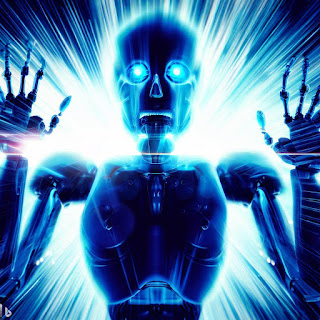The Dark Side of AI: Why Elon Musk and Others are Pushing for Halt to Large-scale Training
Elon Musk, the tech magnate and CEO of Tesla and SpaceX, is among a growing number of experts who are calling for a halt to the large scale training of artificial intelligence (AI). Musk has been warning about the potential dangers of AI for years, and his latest attempts are part of a broader debate about the risks of this rapidly advancing technology.
An open letter has been signed by a group of individuals (scientists, techies, etc.) cautioning about the possible hazards of unchecked development of AI systems. They assert that the competition to advance AI technology has gotten out of hand. One of the signatories, Twitter CEO Elon Musk, advocates for a pause on training AIs with a certain level of capacity for a minimum of six months. Elon has expressed his apprehension regarding AI training that surpasses the level utilized for OpenAI's GPT-4, which could lead to the development of even more potent AI systems than GPT-4. So far 1124 people have signed this open letter.
The letter quotes the CEO of OpenAI's statement to support their argument about the risks associated with large-scale AI training.
At some point, it may be important to get independent review before starting to train future systems, and for the most advanced efforts to agree to limit the rate of growth of compute used for creating new models.
Let us examine the uproar surrounding AI and explore ten convincing reasons why Elon Musk and other experts are advocating for a pause in AI training:
- The possibility of misuse: Musk and other experts fear that AI could be misused by governments or other entities to control populations, suppress dissent, or even wage war.
- Lack of ethical guidelines: As AI becomes more advanced, there is a lack of clear ethical guidelines to regulate its development and use. This leaves the door open for malicious actors to exploit the technology for their own purposes.
- Unintended consequences: AI can have unintended consequences that could be harmful to humans or the environment. For example, an AI system designed to optimize energy use could end up causing a catastrophic failure of the power grid.
- Potential for bias: AI algorithms are only as unbiased as the data they are trained on. If that data is biased or incomplete, the resulting AI system could perpetuate that bias.
- Job displacement: AI has the potential to automate many jobs, leading to widespread job displacement and economic disruption.
- Security risks: AI systems can be vulnerable to cyber attacks, which could allow malicious actors to take control of them and use them for their own purposes.
- Lack of transparency: Many AI systems are opaque, making it difficult to understand how they make decisions or what data they are using to do so. This lack of transparency makes it difficult to trust AI systems and could lead to unintended consequences.
- Regulation lagging behind: Regulatory bodies have been slow to catch up with the rapid pace of AI development, leaving a regulatory gap that could be exploited by those with malicious intent.
- Human-level intelligence: As AI becomes more advanced, there is a possibility that it could reach or exceed human-level intelligence, raising questions about what this would mean for humanity.
- Lack of control: Once AI systems become advanced enough, they could become autonomous and difficult to control, leading to unpredictable behavior that could be harmful to humans or the environment.
There are many compelling reasons to pause AI training until we can better understand the potential risks and develop clear ethical guidelines for its development and use. Elon Musk and other experts are right to sound the alarm and call for caution before we plunge headlong into a future that could be fraught with danger.












No comments: